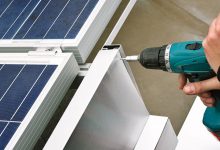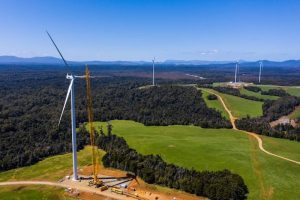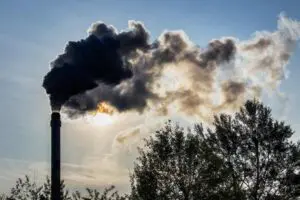The global deployment of wind and solar projects reached a new record level in 2019, as falling costs and a push to zero emissions energy sources presented new opportunities that could be expanded in a post-Covid-19 economic recovery.
The latest Global Trends In Renewable Energy Investment report, published as a collaboration between BloombergNEF, the Frankfurt School and the United Nations Environment Program, estimated that 184GW of new renewable energy capacity, excluding hydro, was added in 2019, representing a 12 per cent annual increase and setting a new annual record.
This strong growth was underpinned by US$282.2 billion (A$405 billion) in global investment, which was down from an all-time record of US$315 billion (A$451 billion) set in 2017.
Thanks to the falling costs of technologies like wind and solar, the assessment found that a higher amount of generation capacity was added in 2019, while investment remained effectively flat compared to 2018. More renewables can now be installed for the same level of investment.
More than three-quarters of the new generation capacity added in 2019 came from non-hydro renewables technologies, like wind and solar, showing the global market for new electricity project had well and truly shifted towards zero emissions sources.
Renewables, excluding large hydroelectric projects, accounted for 13.4 per cent of the world’s total electricity production in 2019.
Wind and solar projects received almost equal investment in 2019 (US$138.2 billion and US$131.1 billion respectively), with a smaller amount of investment also directed towards new biomass and waste to energy projects (US$9.7 billion).
China was the largest investor in renewables projects in 2019, at US$83.4 billion, followed by the United States at $55.5 billion. Australia ranked eighth globally, with US$5.6 billion in investment, after recording a 40 per cent decline on investment compared to 2018.
The UNEP, which co-authored the report, called on governments to heed calls for Covid-19 stimulus measures to be directed towards clean energy investment, as one of the “smartest” investment options available to help drive economic recovery.
“The chorus of voices calling on governments to use their Covid-19 recovery packages to create sustainable economies is growing. This research shows that renewable energy is one of the smartest, most cost-effective investments they can make in these packages,” UNEP executive director Inger Andersen said.
The report was prepared with the assistance of BloombergNEF, which said that the global energy market was at a crucial juncture in 2020, with economic disruption coming at a key point in the transition to zero emissions energy sources.
“Clean energy finds itself at a crossroads in 2020,” chief executive of BloombergNEF Jon Moore said. “The last decade produced huge progress, but official targets for 2030 are far short of what is required to address climate change. When the current crisis eases, governments will need to strengthen their ambitions not just on renewable power, but also on the decarbonization of transport, buildings and industry.”
The report found that there have been government and corporate commitments to build new renewable energy projects amounting to 826GW through to 2030, supporting an additional US$1 trillion in investment over the next decade.
However, the authors also note that this level of investment both lags what was achieved over the last decade, totalling US$2.7 trillion, as well as what will be necessary to meet the goals of the Paris Agreement.
“This lack of ambition can be rectified in economic recovery packages. Simply repeating the investment of the last decade over the next would buy far more clean energy than it did before,” the report says.
“The slump in the fossil fuel sector due to Covid-19, combined with the resilience clean energy has shown during this period, made it clear that clean energy is a smart investment.”
On Wednesday, the International Energy Agency published a new analysis of the global gas market, which detailed how the sector had been hit by unprecedented falls in demand due to Covid-19 related slowdowns, and a surplus of supplies which as seen prices crash.
RenewEconomy and its sister sites One Step Off The Grid and The Driven will continue to publish throughout the Covid-19 crisis, posting good news about technology and project development, and holding government, regulators and business to account. But as the conference market evaporates, and some advertisers pull in their budgets, readers can help by making a voluntary donation here to help ensure we can continue to offer the service free of charge and to as wide an audience as possible. Thankyou for your support.












